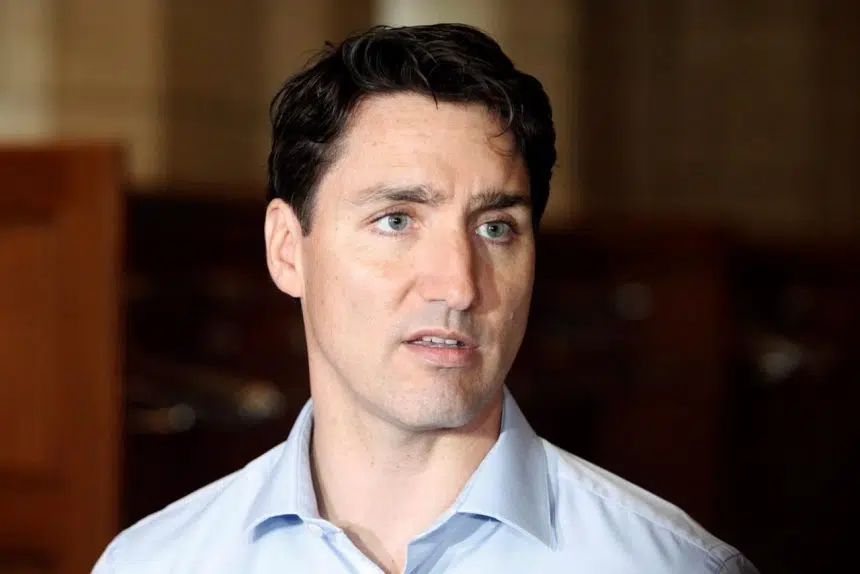QUEBEC — U.S. senior economic adviser Larry Kudlow called his country’s trade dispute with Canada little more than a “family quarrel” Wednesday as media reports swirled about a tense phone exchange last month between President Donald Trump and Prime Minister Justin Trudeau.
Such disputes occur between countries all the time, a sanguine Kudlow told a news conference Wednesday in Washington, adding that he’s confident that the current angst over Trump’s steel and aluminum tariffs will soon blow over.
“I regard this as much like a family quarrel,” Kudlow said. “I’m always the optimist, I believe it can be worked out, and I’m always hopeful on that point.”
He went on to acknowledge the scheduled bilateral meeting between the two leaders at this week’s G7 summit, a gathering that’s widely expected to be a group effort in decrying Trump’s trade tactics to his face and trying to convince him to reverse course.
Good luck, suggested Kudlow, the director of the U.S. National Economic Council.
Regardless of what the rest of the world might think, Trump is deadly serious about reforming a global trade system he believes is fundamentally broken, Kudlow said. And tariffs are simply one more tool in the president’s toolbox when it comes to repairing it.
The remarks underscore the differences between Trump and his fellow G7 leaders over the usefulness of the international multilateral world order, something Trudeau and the other world leaders are struggling to defend.
“We may have tactical disagreements, but he has always said — and I agree — tariffs are a tool in that effort. People should realize how serious he is in that respect,” said Kudlow.
Kudlow also pointedly denied a media report suggesting U.S. Treasury Secretary Steve Mnuchin tried to talk the president into extending an exemption for Canada from the steel tariffs, calling it “patently false.”
He also refused to discuss what media reports are describing as a tense phone call recently between Trump and Trudeau.
Foreign Affairs Minister Chrystia Freeland said Trump and Trudeau have a “truly warm personal relationship” but she reiterated Canada’s position that the tariffs are an illegal action against America’s closest allies.
Officials in the Prime Minister’s Office would not provide details, other than to say it took place on May 25 — the day Trudeau has said he initially proposed a face-to-face meeting with Trump to try to finalize a new North American Free Trade Agreement.
That plan fell through when the White House tried to insist that he agree to including a so-called “sunset clause” in the deal.
Trump has since mused about replacing NAFTA with bilateral trade deals with Canada and Mexico — an idea Trudeau said Wednesday is not on.
“We have on various occasions heard the president speak about his interest or his musings about bilateral deals, instead of the trilateral NAFTA that we have,” Trudeau said.
“Canada’s position is and always has been that the trilateral approach is actually better for Canada, Mexico and the United States. We think that demonstrating the strength of NAFTA as a solid community as we take on the world is very much in all three of our advantages, and we’re going to continue to negotiate that way.”
Kudlow insisted Wednesday the NAFTA talks are still ongoing, but he wouldn’t say whether a deal could be reached this year.
“Communication lines are open,” he said. “I don’t want to make a prediction.”
The G7 summit was supposed to be Trudeau’s moment for Canada to shine on the world stage.
Now, the event has been transformed into an exercise in pure survival for the prime minister — and it includes trying to prevent Trump from taking a wrecking ball to this exclusive club of the world’s leading democracies.
Canada’s non-American G7 partners don’t envy Trudeau; some are downright sympathetic.
“This upcoming summit won’t be an easy one, and the leadership of the Canadian government is very much counted upon,” Kimihiro Ishikane, Japan’s ambassador to Canada, said in an interview.
When Trudeau won power, the bedrock of his foreign policy was to return Canada to its traditional multilateral leanings — support for institutions such as the United Nations, NATO, the G7 and the international trading order.
Trump is no fan of multilateralism. Now the G7’s future is in doubt, with Trump’s imposition of steel and aluminum tariffs on his G7 partners, as well as broader disagreements on the trade and climate change. All are symptoms of the underlying divide that many are now calling the G6 plus one.
As one European G7 official put it, this is a “terrible time to have the presidency” of the G7.
Trudeau is seen as the best bet to build a bridge between Trump and the rest of the G7 because his government has been able to forge deep links with the U.S. administration and across the various levels of American politics and business, the official said.
For the summit to succeed, and for the G7 to carry on, Trudeau needs to “show off the glue” that binds what are still fundamentally like-minded countries.
That means strong, united statements rebuffing Russian electoral interference, or a commitment to improve the state of the world’s oceans, which is widely seen as a smart Canadian compromise to get Trump to address climate change without specifically referencing it.
Ishikane said Japan’s top priority is to see the projection of “unity” at the G7 this week.
“I think the resilience of liberal democracy or resilience of free market economy is in question.”
Mike Blanchfield and Andy Blatchford, The Canadian Press











